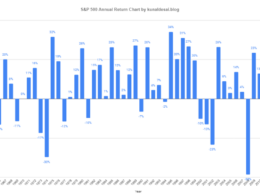Table of Contents
Discover how to invest in AI and seize opportunities in the future.
We assess all recommended products and services on our own. If you click the links we share, we might get paid. Find out more.
Artificial Intelligence (AI), which involves using machines to imitate and perform human-like tasks in various fields, is gaining much attention due to its increasing importance in our daily lives and economy. As AI advances, investors seek ways to benefit from this significant growth industry.
Similar to previous technological advancements like railroads in the late 1800s or personal computers in the 1980s, there are various ways to invest in this new trend. However, like with any emerging technology, some companies will succeed while others may not.
Similar to the computer revolution, AI aims to automate tasks that previously required human intelligence. This article will explore how investors can profit from AI’s expected growth as it transitions from theoretical concepts to practical applications in our economy.
How to Invest In AI
Investing in industries or market sectors, like AI, can be a smart move as it’s quickly becoming a major game-changer. Spotting these new trends and investing in innovative companies can lead to big profits. However, with lots of competition, picking the winning companies isn’t always easy.
Sometimes, the first company to come up with a new idea becomes the leader in the market. Other times, a company that follows the trend but improves on the original idea is more successful.
Some investors may want to invest directly in AI development companies, while others might prefer investing in companies that benefit from widely used AI. For example, during the rise of personal computers, investors could have invested in computer manufacturers, software companies, or businesses that benefited from computer automation.
Investing in new technologies can be risky, so some choose safer options like backing already strong companies that stand to gain from the technology’s growth. But remember, not every investment pays off when new tech emerges.
Lastly, with AI changing the job market and displacing workers, there could be opportunities to invest in companies focusing on worker retraining. Now, let’s discuss some individual stocks that match these investment criteria in the AI sector.
Invest in AI Stocks and ETFs
Leading Companies in AI
- Tesla (TSLA): Tesla is one of the biggest names in AI, and what they do is pretty straightforward. They use AI to make driving easier by automating some parts of it. This means their cars constantly use AI to process data and figure out things like other cars on the road, the condition of the roads, traffic lights, and people walking around. Just like when we drive, cars need to keep scanning and processing information to adapt to changes happening in real time.
- NVIDIA (NVDA): NVIDIA is a top AI technology player known for its powerful position in the market. They specialize in generative artificial intelligence, which means they use special algorithms to generate new content in various forms like audio, images, text, and more. NVIDIA has developed everything needed for AI systems, including computer chips, hardware, software, and tools for development. They use thousands of graphic processing units (GPUs) to run their AI systems, and currently, they hold an 88% share in the GPU market.
- Microsoft (MSFT): Microsoft has invested $13 billion in AI projects, including a significant $1 billion in OpenAI, known for its popular ChatGPT AI. They’ve integrated AI into products like Bing search, Microsoft 360, X-Box, and GitHub coding tools. Microsoft also plans to expand its AI ecosystem by creating frameworks for AI apps and copilots and enhancing its AI plug-in system.
- Taiwan Semiconductor Manufacturing (TSM): Taiwan Semiconductor Manufacturing is the largest chip maker globally and a key player in manufacturing chips for artificial intelligence. With the increasing demand for powerful computing chips, TSM remains a stable choice as AI technology expands. It also produces chips for other computer applications, reducing the risk of investing solely in AI-focused companies.
- Meta Platforms (META): Meta has invested heavily in AI technology. It uses a large language module (LLM) AI to improve search results and anticipate user preferences. Additionally, Meta has designed its silicon chip for AI processing tasks and developed an advanced data center for enhanced performance.
- Amazon.com (AMZN): Amazon utilizes AI technology in its Alexa system and provides its customers with machine learning (ML) and AI tools. Amazon’s cloud computing division, Amazon Web Services (AWS), offers an AI infrastructure that enables customers to analyze data and integrate AI into their operations. With over 100,000 customers, AWS provides AI and ML services to personalize recommendations, enhance safety and security measures, analyze business data, and boost customer engagement.
- Apple (APPL): Apart from Siri, which uses AI for customer interactions, Apple will also benefit from a share of AI services offered on its platform. A notable example is OpenAI, which recently introduced its iPhone app for ChatGPT; Apple will receive 30% of its revenue. Besides AI firms providing services through Apple’s platform, the company can use its substantial cash reserves to develop or acquire AI technologies.
Compare Some Top Brokers for Investing in AI Stocks
| Platform | Account Minimum | Fees |
| Merrill Edge | $0 | Trade stocks for free and options for just $0 per leg plus $0.65 per contract. |
| E*TRADE | $0 | Enjoy commission-free stock and ETF trades. Options trading costs vary based on volume, ranging from $0.50 to $0.65 per contract. |
Best AI ETFs
Investing in ETFs or mutual funds managed by professionals who specialize in AI companies means experts do the research and choose the best stocks to invest in. This gives investors a diverse portfolio of AI stocks in one investment. Checking their track records and fees to maximize returns is important when investing in funds.
- iShares Exponential Technologies ETF (XT): XT is a big fund that picks worldwide stocks aiming to shake up their industries. Nearly half of the fund is in AI tech stocks, while the other half is in healthcare and industrial stocks. These industries are exploring how AI can bring significant changes. The fund has a fee of 0.46% and pays out a dividend of 0.70% annually.
- Defiance Machine Learning & Quantum Computing ETF (QTUM): QTUM is a small fund with $112 million in assets. It invests in companies aiming to bring their research and development in quantum computing systems to the market. The fund follows the BlueStar Quantum Computing and Machine Learning Index. It has a fee of 0.40% and an annual dividend yield of 0.45%.
- ROBO Global Robotics & Automation Index ETF (ROBO): ROBO invests in companies specializing in robotics, automation, and artificial intelligence, as well as in growth and value stocks. The fund charges a fee of 0.95% and offers an annual dividend yield of 0.17%.
Compare Some Top Brokers for Investing in AI ETFs
| Company | Account Minimums | Fees |
| Fidelity | $0 | Trade stocks and ETFs for free, and pay only $0 plus $0.65 per contract for options trading. |
| Interactive Brokers | $0 | Enjoy commission-free trading for equities and ETFs with IBKR’s TWS Light platform, or opt for low costs based on trading volume for active traders who need advanced features like order routing. Options trading on TWS Light is priced at $0.65 per contract, also the base rate for TWS Pro users, with rates adjusted according to trading volume. Futures trading costs $0.85 per contract. |
| Charles Schwab | $0 | Trade stocks and ETFs for free and pay only $0.65 per contract for options trading. |
How to Search for AI Investments
Investing in individual AI stocks requires more effort from investors. To start, they need to research the AI industry to grasp its different aspects, as there are various ways to invest in this sector. Investors must choose between pure plays and conservative plays within the AI market. Once they know where they want to invest in the AI market, they should use traditional fundamental and technical analysis for their investment decisions.
- Earnings forecasts: Earnings are a key indicator of a company’s performance, especially for AI companies. Investors generally favor AI companies with steady and increasing earnings, as they are often seen as growth stocks. The release of earnings reports can cause significant movements in AI stock prices.
- Annual reports: Annual reports give valuable details about a company’s actions, while financial statements help investors assess financial health using metrics like debt-to-equity ratio. These tools aid in making informed stock investment choices.
- Relative performance vs. the market: Relative performance compares how a stock fares to an index or another stock. When evaluating newer AI companies, comparing their performance with similar companies in the industry is helpful.
- Growth: analysis examines how a company grows over time by assessing earnings and market share factors. It helps investors gauge the company’s strength and future potential.
- Analyst projections: For investors new to AI, analysis projections and research reports can provide valuable insights. The AI market is volatile, with rapid changes in technology and company prospects. Professional researchers offer perspectives on the overall AI landscape and the potential of individual stocks compared to competitors in the sector.
FAQs
1. Can Investors Make Money in AI?
Ans: As the use of artificial intelligence grows, it’s expected to expand further into various industries and real-world applications. This presents investment opportunities but also risks. Investors can choose to invest directly in AI companies or opt for ETFs and mutual funds that include multiple AI companies in their portfolios. Additionally, investing in well-established companies poised to benefit from the widespread adoption of AI is another option to consider.
2. How Can You Invest in AI Art?
Ans: Artificial intelligence can now create art based on user input. Users can describe an image they want, and AI programs use this description and images available online to generate the requested artwork. People from various backgrounds and ages have used AI-generated artwork.
However, AI-generated art raises copyright concerns. Since these programs create art based on existing examples, many artists feel their copyrights are being infringed upon, risking their livelihoods. Some publicly traded companies, like Pinterest, Getty Images, Snap Inc., and Shutterstock, have extensive collections of artwork used by AI art generators.
3. How Can You Invest in AI Startups?
Ans: Many startup companies have emerged in promising fields like artificial intelligence and machine learning. These companies often receive funding from venture capital investors before going public to raise more capital and expand their operations. Investing in startups carries risks, but successful ones like Apple, Amazon, and Microsoft can yield significant rewards for early investors.
4. Can You Invest Directly in AI?
Ans: Investors can directly invest in artificial intelligence and machine learning through individual stocks, ETFs, or mutual funds specializing in AI stocks. Both popular, widely held AI stocks and lesser-known ones could be promising investments.










